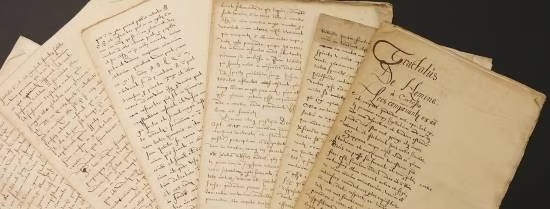After 350 years a hitherto unknown manuscript based on a text by the world-famous philosopher René Descartes (1596–1650) has been unearthed by Dr. Erik Jan Bos at the Leiden University Libraries. With the original text being lost, this re-discovery is all the more important. Because with this manuscript the possibility arises to settle many scholarly debates regarding the philosophers work.
After 350 years a new source
In 1633 René Descartes was about to finish a two-part book, consisting of Le monde (The World), describing the natural laws that govern the universe and L'homme (On Man), which examined the body of the humans inhabiting this world. However, after hearing about the papal condemnation of Galileo, Descartes abandoned the publication to avoid a similar fate. Now, after 350 years, a new translation of L’homme has been found. The text had remained hidden in the archives of the Bibliotheca Thysiana since the seventeenth century. The manuscript pays a lot of attention to neurophysiology, the way in which the brain functions, and an organ called the pineal gland which, according to Descartes, is the link between the immaterial mind and the body.
The original manuscript by Descartes was lost and only two printed versions of L'homme have survived up until now. A Latin translation from 1662 by Florentius Schuyl (1619–1669), who went on to become professor of medicine in Leiden, and a French text from 1664 delivered by French editor of Descartes’ works and correspondence, Claude Clerserlier. Because there are significant differences between these two texts the true meaning of L’homme has been the subject of many scholarly debates. The rediscovered Latin manuscript translates the original French text almost word by word, unlike the translation by Schuyl, and provides the possibility to discover the correct reading and resolving many of the debates. The identity of the translator is (so far) unknown.
The re-discovery at the Leiden University Libraries
The reason that the manuscript was overlooked for three centuries was its location: the archives of the Bibliotheca Thysiana. This library still exists in its original state and although the collections from it are well known to specialists, the archives were, until recently, unknown. The archives were transferred to the care of Leiden University Libraries in 2013 and the inventory was completed in 2017. The manuscript was discovered by Dr. Erik Jan Bos a researcher for the Erasmus school of philosophy. He is preparing its publication with a critical appraisal of the other two sources and expects the find to take the discussion and interpretation of the work to the next level.
A find of significant academic importance
The importance of this manuscript cannot be underestimated. The manuscript sheds a new light on many questions that have puzzled historians of philosophy, science and medicine for over three centuries. Not only can many textual disagreements be settled, but it also provides a new impetus for many discussions regarding the content of Descartes’ philosophy. For the text appears to substantiate the claim that Descartes is not the inventor of a strongly dualistic worldview, adhering to a strict separation between mind and body, but was a actually an avid researcher into the unity of the two.
- Researcher
- More information
Press Officer: Eddie Adelmund (Adelmund@esphil.eur.nl)
The Erasmus Trust Fund has contributed to Descartes' research.

